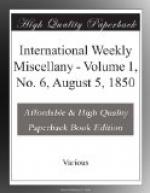A terrible fellow to meet in society,
Not the toast that he buttered was ever
so dry at tea.
And this gentleman is finely shown up for his condemnatory predilections and inability to discern or appreciate beauties. The cream of the joke against him is, that being sent by Apollo to choose a lily in a flower-garden, he brings back a thistle as all he could find. The picture is a humorous one, but we are at a loss to conjecture who can have sat for it in America, where the tendency is all the other way, reviewers being apt to apply the butter of adulation with the knife of profusion to every man, woman, or child who rushes into print. Some of his complaints, too, against the critic sound very odd; as, for instance, that
His lore was engraft, something foreign that grew in him.
Surely the very meaning of learning is that it is something which a man learns—acquires from other sources—does not originate in himself. But it is a favorite practice with Mr. Lowell’s set to rail against dry learning and pedants, while at the same time there are no men more fond of showing off cheap learning than themselves: Lowell himself never loses an opportunity of bringing in a bit of Greek or Latin. Our readers must have known such persons—for, unfortunately, the United States has no monopoly of them—men who delight in quoting Latin before ladies, talking Penny-Magazine science in the hearing of clodhoppers, and preaching of high art to youths who have never had the chance of seeing any art at all. Then you will hear them say nothing about pedantry. But let a man be present who knows more Greek than they do, or who has a higher standard of poetry or painting or music, and wo be to him! Him they will persecute to the uttermost. What is to be done with such men but to treat them a la Shandon, ’Give them Burton’s Anatomy, and leave them to their own abominable devices?’
“The Biglow Papers are imaginary epistles from a New England farmer, and contain some of the best specimens extant of the ‘Yankee,’ or New England dialect,—better than Haliburton’s, for Sam Slick sometimes mixes Southern, Western, and even English vulgarities with his Yankee. Mr. Biglow’s remarks treat chiefly of the Mexican war, and subjects immediately connected with it, such as slavery, truckling of Northerners to the south, &c. The theme is treated in various ways with uniform bitterness. Now he sketches a ‘Pious Editors Creed,’ almost too daring in its Scriptural allusions, but terribly severe upon the venal fraternity. At another time he sets one of Calhoun’s pro-slavery speeches to music. The remarks of the great Nullifier form the air of the song, and the incidental remarks of honorable senators on the same side make up a rich chorus, their names supplying happy tags to the rhymes. But best of all are the letters of his friend the returned volunteer, Mr. Birdofredom Sawin, who draws a sad picture of the private soldier’s life in Mexico. He had gone out with hopes of making his fortune. But he was sadly disappointed and equally so in his expectations of glory, which ’never got so low down as the privates.’




